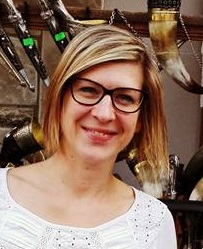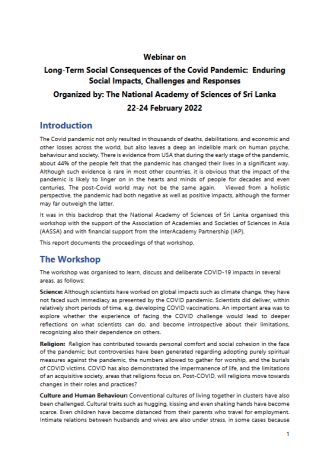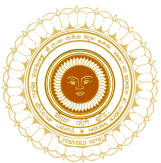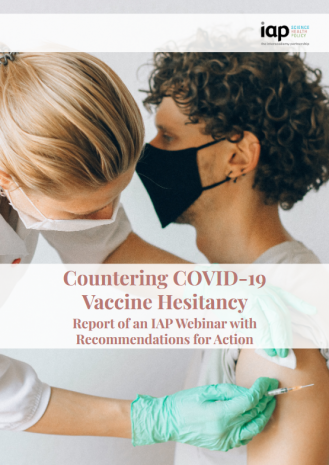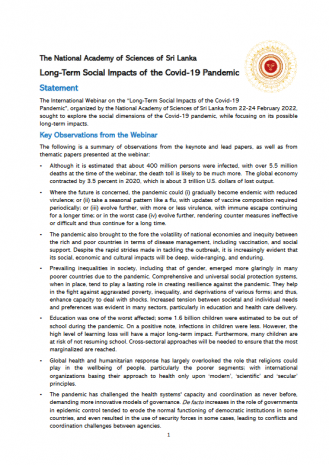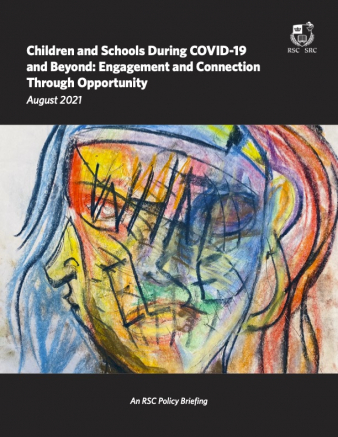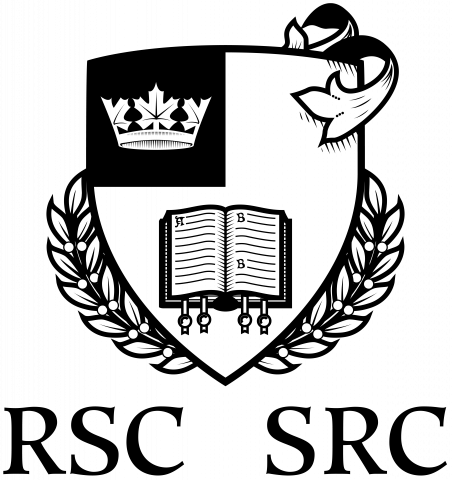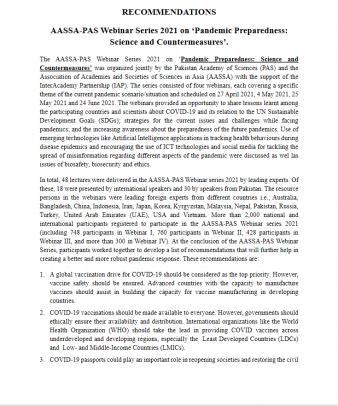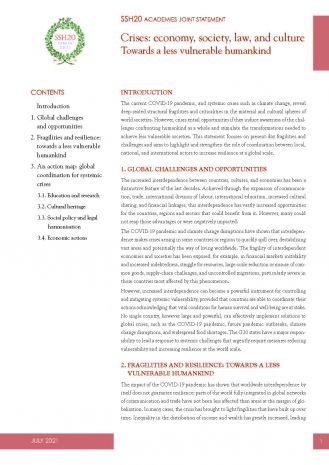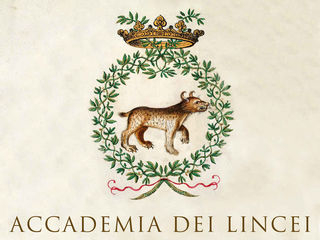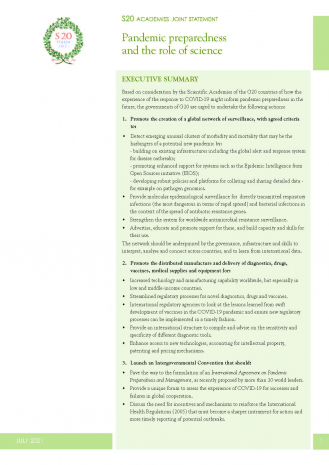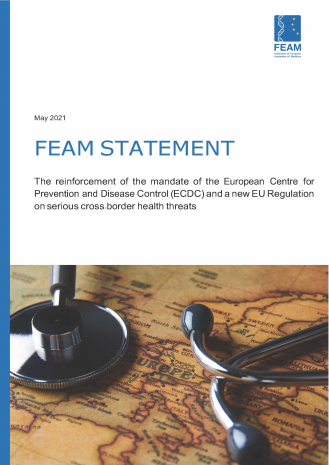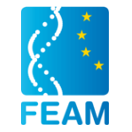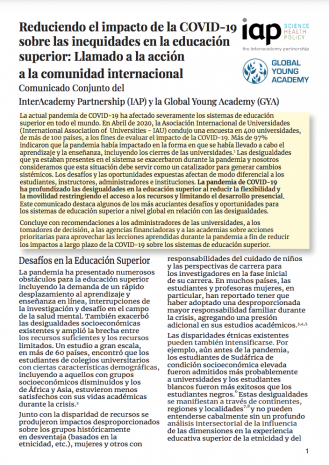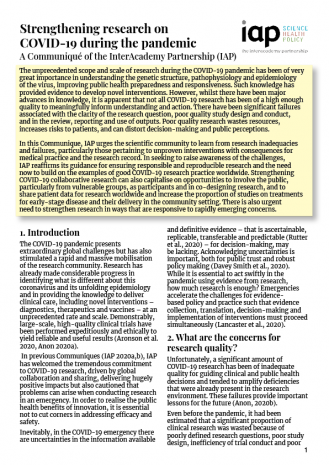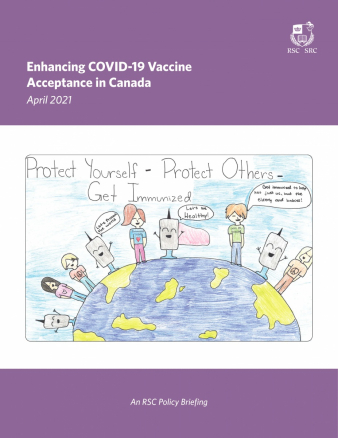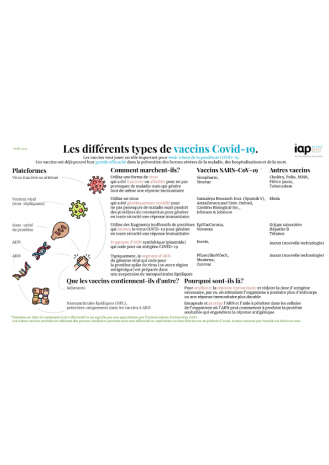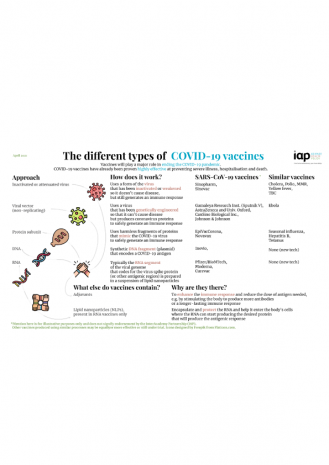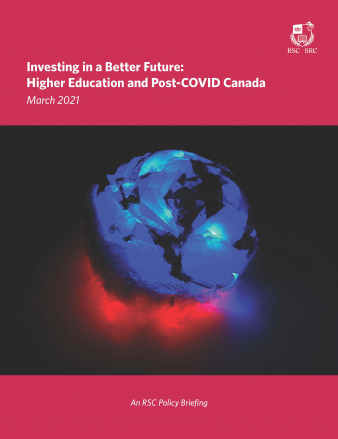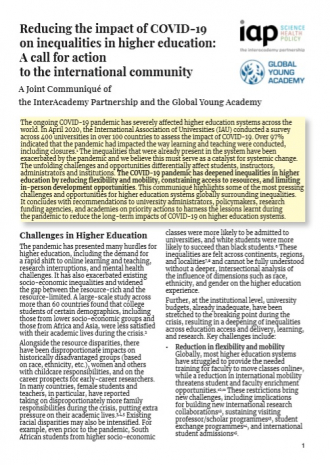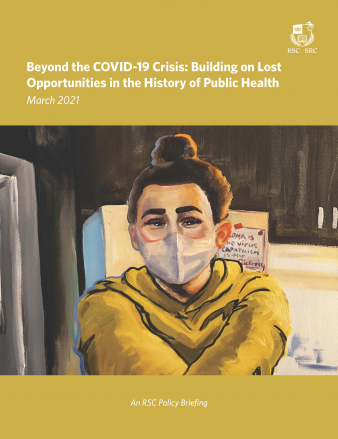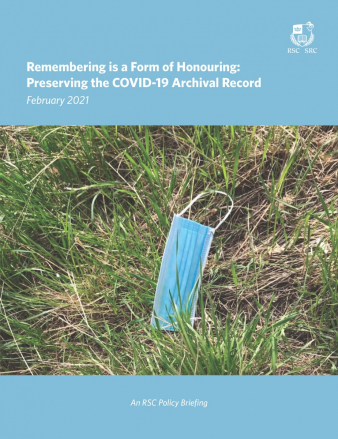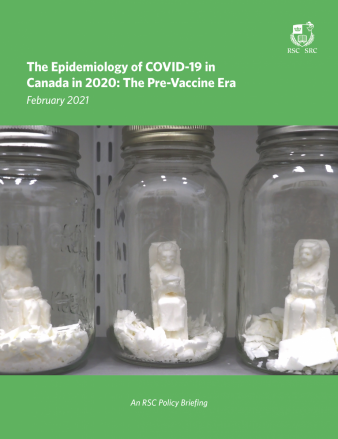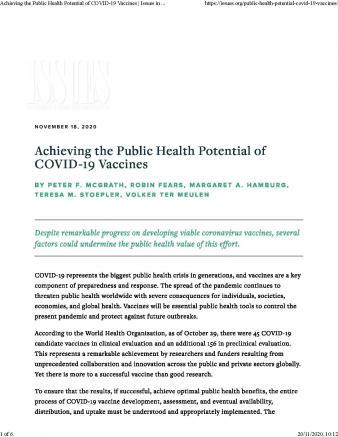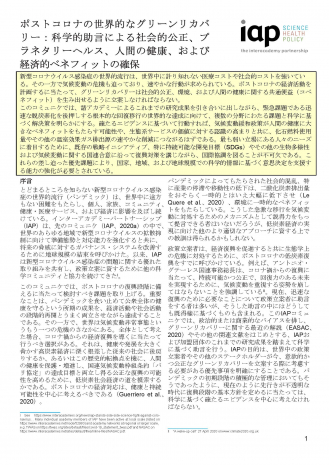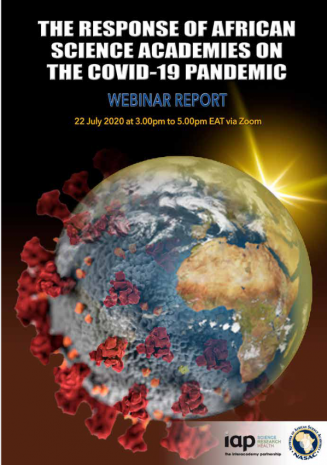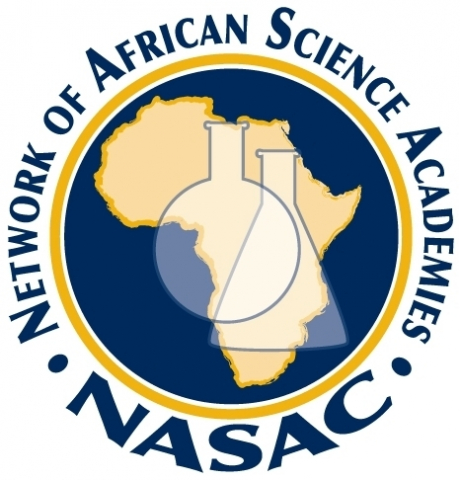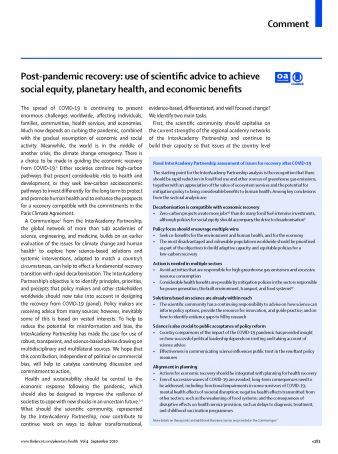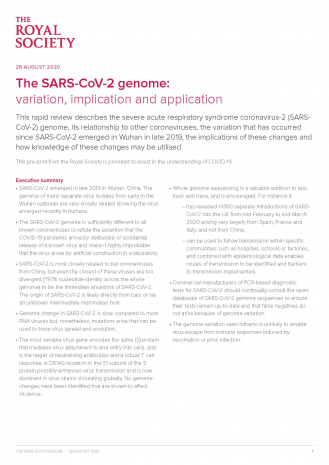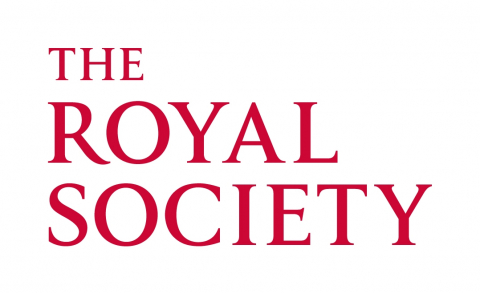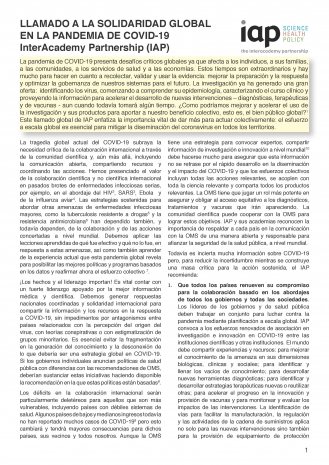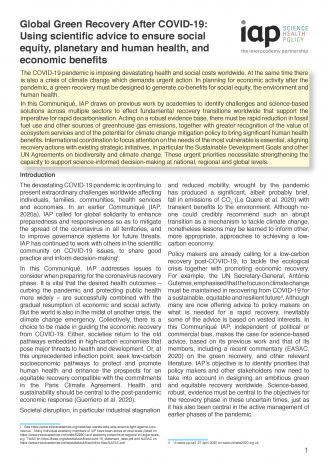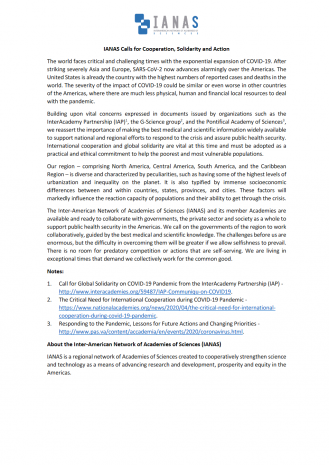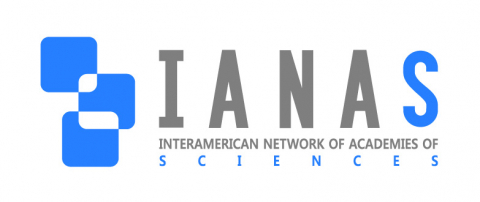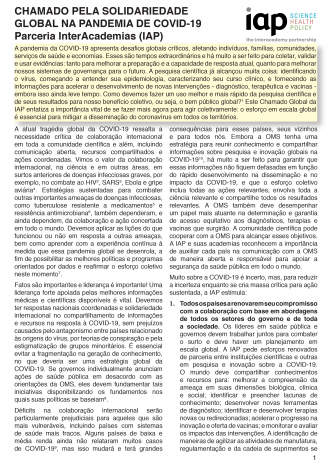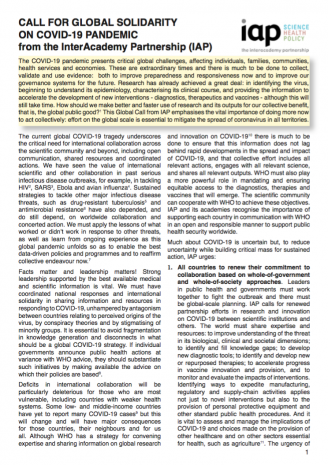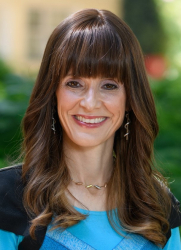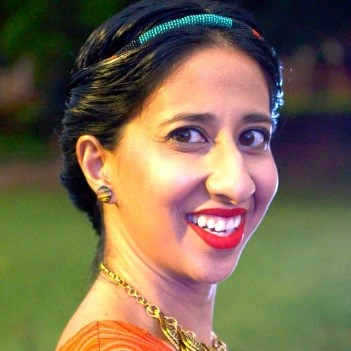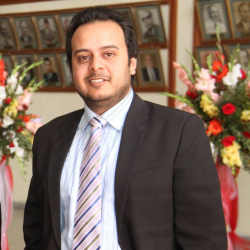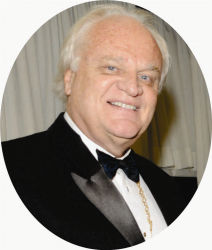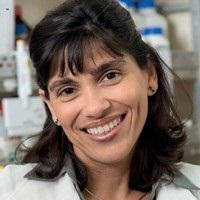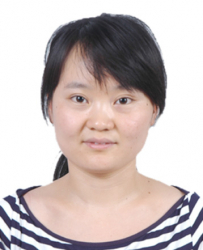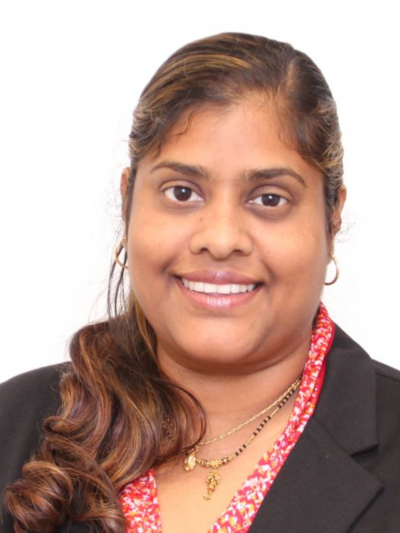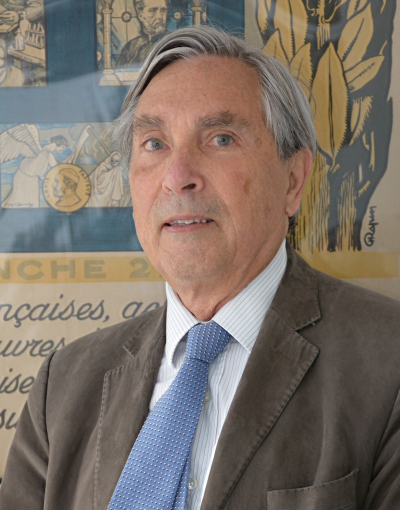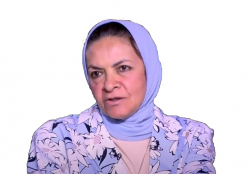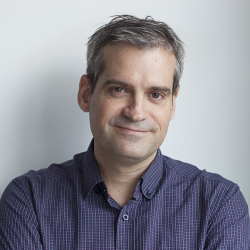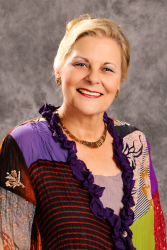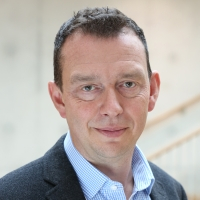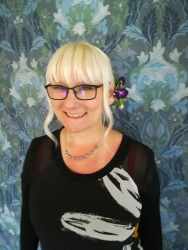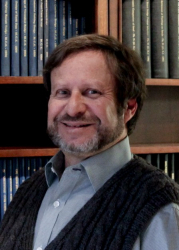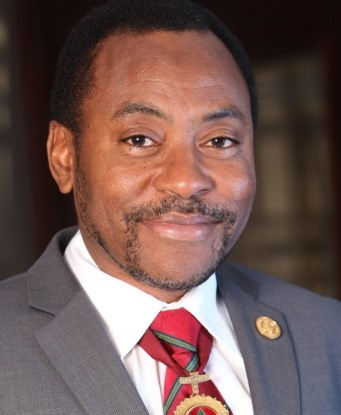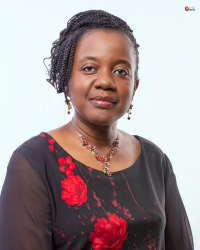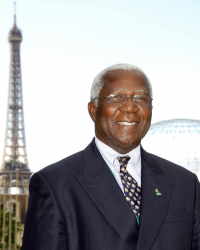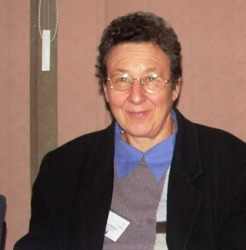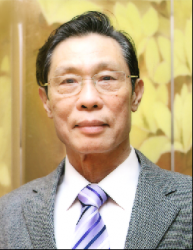Academy Response to COVID-19
Overview
Since the beginning of the pandemic, the InterAcademy Partnership (IAP) issued three communiqués related to the crisis: the IAP Communiqué on the COVID-19 pandemic, a call for collective action on the global scale to improve and accelerate the use of research and its outputs for the global public good; the IAP Communiqué on Green Recovery, that highlights that fact that only a low-carbon recovery can generate co-benefits for social equity, the environment, and human health; and the IAP Communiqué on the Development and Distribution of Vaccines against COVID-19, whose main messages is that cutting corners in the race for a COVID-19 vaccine, anti-vaxxers, and vaccine nationalism are all a public health threat.
Furthermore, IAP launched the IAP COVID-19 Expert Group, a Group charged with responding to inquiries routed through academies related to the ongoing COVID-19 pandemic across a broad range of health, social, environmental and other direct and indirect consequences (more info on the second tab of this page).
In 2021 IAP also organized the IAP Global Webinar on Countering Vaccine Hesitancy that took place on Tuesday 23 March and was designed to help academies prepare for national vaccination efforts (further details on the event, the webinar recording and speakers’ presentations are available at this link).
During 2021 World Immunization Week, IAP released an infographic to shed some light on the different types of COVID-19 vaccines, how they are developed, and how they work, and 5 bite-size videos that present aspects of vaccine science, regulation and the ‘infodemic’ in manageable nuggets of information.
In addition, many IAP member academies around the world are playing their own part in national or regional initiatives – helping to ensure that trustworthy and credible information is reaching as many people as possible, much of it in local languages.
Here we have collated (and will continue to update) information being provided by more than 140 national, regional and global academies and academy networks. For an updated summary of IAP’s COVID-19 related activities, please click here.
IAP member academies are responding by:
- Providing evidence-based advice to governments at the municipal, national and regional level by participating in governmental task forces and commissions, supporting real-time policy review, synthesizing and distilling the best available scientific evidence, and by issuing statements and recommendations for decision-makers
- Establishing expert databases for decision-makers with relevant expertise
- Conducting public outreach to help their communities understand public health guidance, including through translation into local languages and engaging migrant communities
- Engaging with the media to ensure scientifically accurate information is available to all
- Sharing data and experiences amongst their members and with other academies in their region and gathering lessons learned
- Conducting COVID-19 related research and modelling in academies with their own research facilities
- Providing technical training, for example via online telemedicine courses, diagnostic laboratory techniques
- Providing fast-track reviews of COVID-19 related-research proposals
Additional links to other trusted resources are available via this news article: IAP stands side-by-side with science in the fight against coronavirus.
From national academies
- Albania, Albanian Academy of Sciences
- Argentina, Academia Nacional de Medicina de Buenos Aires
- Argentina, National Academy of Sciences, Cordoba
- Australia, Australian Academy of Sciences
- Belgium, Académie Royale de Médecine de Belgique [in French]
- Benin, Benin National Academy of Sciences [in French]
- Brazil, Brazilian Academy of Medicine
- Brazil, Brazilian Academy of Sciences
- Bulgaria, Bulgarian Academy of Science
- Cameroon, Cameroon Academy of Sciences
- Canada, Royal Society of Canada
- Canada, Canadian Academy of Engineering
- Canada, Canadian Academy of Health Sciences
- China, Chinese Academy of Engineering
- China, Chinese Academy of Sciences
- Taiwan, China, Academia Sinica
- Colombia, Colombian Academy of Exact, Physical and Natural Sciences [in Spanish]
- Croatia, Croatian Academy of Sciences and Arts [in Croatian]
- Cuba, Cuban Academy of Sciences [in English, Spanish]
- Czech Republic, Czech Academy of Sciences
- Denmark, Royal Danish Academy of Sciences and Letters [in Danish]
- Estonia, Estonian Academy of Sciences
- Egypt, Academy of Scientific Research and Technology (ASRT)
- France, French Academy of Sciences [in French]
- France, French National Academy of Medicine
- Germany, German National Academy of Sciences, Leopoldina
- Holy See, Pontifical Academy of Sciences and Pontifical Academy of Social Sciences
- Honduras, National Academy of Sciences of Honduras
- Hungary, Hungarian Academy of Sciences
- India, Indian National Science Academy, New Delhi
- Ireland, Royal Irish Academy
- Israel, Israel Academy of Sciences and Humanities
- Italy, Accademia Nazionale dei Lincei [in English and Italian]
- Japan, Science Council of Japan
- Jordan, Royal Scientific Society of Jordan
- Lithuania, Lithuanian Academy of Sciences [in Lithuanian]
- Macedonia, Macedonian Academy of Sciences and Arts [in Macedonian]
- Malaysia, Academy of Sciences Malaysia
- Mauritius, Mauritius Academy of Science and Technology
- Mongolia, Mongolian Academy of Sciences [in Mongolian]
- Morocco, Hassan II Academy of Science and Technology [in English and French]
- Republic of Moldova, Academy of Sciences of Moldova [in Moldovan]
- Netherlands, Royal Netherlands Academy of Arts and Sciences
- Nicaragua, Nicaraguan Academy of Sciences [in Spanish]
- Nigeria, Nigerian Academy of Sciences
- Norway, The Norwegian Academy of Science and Letters [in Norvegian]
- Peru, National Academy of Sciences of Peru
- Peru, National Academy of Medicine [in Spanish]
- Philippines, National Academy of Science and Technology
- Poland, Polish Academy of Sciences
- Romania, Academy of Medical Sciences of Romania
- Russia, Russian Academy of Sciences [in Russian]
- Serbia, Serbian Academy of Sciences and Arts
- Slovakia, Slovak Academy of Sciences
- South Africa, Academy of Science of South Africa
- South Korea, Korean Academy of Science and Technology (KAST) [in Korean]
- Sudan, Sudanese National Academy of Science (SNAS)
- Sweden, The Royal Swedish Academy of Sciences [in Swedish]
- Switzerland, Swiss Academies of Sciences
- Turkey, Turkish Academy of Sciences (TÜBA)
- Ukraine, National Academy of Sciences of Ukraine [in Ukrainian]
- United Kingdom, Academy of Medical Sciences
- United Kingdom, Royal Society
- USA, The National Academies of Sciences, Engineering and Medicine (NASEM)
- USA, National Academy of Medicine
- Venezuela, Academy of Physical, Mathematical and Natural Sciences [in Spanish]
From global and regional academies and networks
- ALLEA - ALL European Academies
- African Academy of Sciences
- African National Academies
- Federation of European Academies of Medicine (FEAM)
- Global Young Academy [in Arabic, Bengali, Bosnian, English, German, Chinese (simplified and traditional), French, Greek, Hebrew, Italian, Malay, Maltese, Nepali, Portuguese, Punjabi, Russian, Japanese, Persian, Spanish]
- NASAC
- TWAS
- World Academy of Art & Science (WAAS)
Trusted sources on vaccines
- More Than 6.36 Billion Shots Given: Covid-19 Tracker (Bloomberg)
- How are countries encouraging their citizens to get vaccinated?
- COVAX - COVAX is one of three pillars of the Access to COVID-19 Tools (ACT) Accelerator, which was launched in April by the World Health Organization (WHO), the European Commission and France with the aim of providing innovative and equitable access to COVID-19 vaccines
- European Vaccination Information Portal - Lays out the European strategy and highlights benefits of vaccination for individuals and communities
- The COVID-19 Vaccine Communication Handbook. A practical guide for improving vaccine communication and fighting misinformation
- Statement of Strong Medical Consensus for Vaccination of Pregnant Individuals Against COVID-19 | ACOG – by the American College of Obstetricians and Gynecologists
- Communications strategies to promote vaccine confidence in the United States - from the National Academies
- Increasing Uptake of COVID-19 Vaccination Through Requirement and Incentive Programs – National Academies of Sciences, Engineering, and Medicine (NASEM) report
- 'Communication Strategies for Building Confidence in COVID-19 Vaccines -Addressing Variants and Childhood Vaccinations' (2021) -by NASEM
- Brochure on vaccination available in Dutch, Arabic, English and Turkish –by the Medical Section of the Royal Netherlands Academy of Arts and Sciences (KNAW)
- The Globe and Mail - Understanding vaccine hesitancy - Based on the report 'Understanding vaccine hesitancy in Canada: attitudes, beliefs, and the information ecosystem by Canada's Media Ecosystem Observatory
- The COVID-19 vaccines rush: participatory community engagement matters more than ever - in The Lancet
- COVID-19 vaccine deployment: Behaviour, ethics, misinformation and policy strategies- by The Royal Society
- Social Science in Humanitarian Action Platform (SSHAP)
- WHO - Country readiness and delivery of vaccines
- WHO- How do vaccines work
- WHO-The different types of COVID-19 vaccines
- WHO- How are vaccines developed?
- WHO- Manufacturing, safety and quality control of vaccines
- WHO- Access and allocation: how will there be fair and equitable allocation of limited supplies?
Other reputable sources on Covid-19
- African Union
- American Society for Microbiology
- ACT- Accelerator
- CERN
- COVID-19 Research Project Tracker
- COVID-19 Multi-Model Comparison Collaboration (CMCC)
- European Centre for Disease Control
- Global MediXchange for Combating COVID-19 (GMCC)
- G-Science Academies of Science and of Medicine
- INGSA Science advice and Covid-19
- Institute of Development Studies – the social science response to the pandemic
- International Food Policy Research Institute (IFPRI)
- Intergovernmental Panel on Climate Change (IPCC)
- ISC
- Latin American Association of National Academies of Medicine (ALANAM) [in Spanish]
- The Lancet COVID-19 Commission
- M8 Alliance of Academic Health Centers, Universities and National Academies
- SAPEA – Science Advice for Policy by European Academies
- The Government of the Republic of Korea - Health, Quarantine and Economic Measures: Korean Experience
- United Nations Educational, Scientific and Cultural Organization (UNESCO)
- United Nations Office for Disaster Risk Reduction (UNDRR)
- Verified – UN Initiative
- World Health Organisation (WHO)
- The Guardian
Project
Publications
Project
Updates
IAP COVID-19 EXPERT GROUP
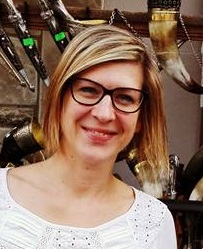
The IAP COVID-19 Advisory Group brings together a wealth of multi-disciplinary expertise nominated by its member academies. It has been established to respond to inquiries and requests for advice related to the ongoing pandemic. The multi-disciplinary nature of the Group will allow IAP to respond to a broad range of health, social, environmental and other direct and indirect consequences of the pandemic.
Requests for such advice should be submitted by IAP member academies*. Requests from other bona fide organizations are accepted if submitted through an IAP member academy.
Suminori Akiba, Science Council of Japan - Epidemiology
Fernando Arenzana-Seisdedos, Chinese Academy of Sciences - Virology, Epidemiology
Yiming Bao, Chinese Academy of Sciences - Virology, Data Analytics, contact tracing networks/mobile software system
Mauricio Barreto, Brazilian Academy of Sciences - Epidemiology, Public health,
Rafael Bello, Cuban Academy of Sciences - Mathematical modelling, Data Analytics
Yoav Benjamini, Israel Academy of Sciences and Humanities - Data Science
Eyal Benvenisti, Israel Academy of Sciences and Humanities - International law
Patrick Berche, Academie Nationale de Medecine - Infectious diseases, Bacteriology
Michal Biron, Global Young Academy - Social determinants of health, Social sciences, Ethics
Jeanne Brugere-Picoux, Academie Nationale de Medecine (France) - Veterinary Medicine
Yves Buisson, Academie Nationale de Medecine (France) - Infectious diseases
Stephanie Burton, Academy of Science of South Africa - Ethics, Scientific Literacy, Public Health
Geoff Chase, Royal Society of New Zealand Te Aparangi - Critical care medicine, Mathematical modelling
Miodrag Čolić, Serbian Academy of Sciences and Arts - Immunology
Philip Dawid, The Royal Society (UK) - Statistics
María Guadalupe Guzmán Tirado, Cuban Academy of Sciences - Virology, Epidemiology
Luis Saturnino Herrera Martinez, Cuban Academy of Sciences - Virology, Epidemiology
Didier Houssin, Academie Nationale de Medecine (France) - Public Health
Abdel Meguid Kassem, Academy of Scientific Research & Technology (Egypt), Public health
Rees Kassen, Global Young Academy - Epidemiology, Science literacy
Lemme Prica Kebaabetswe, Botswana Academy of Science - Virology, microbiology, immunology
Dominique Kerouedan, Academie Nationale de Medecine (France)- Social determinants of health, Public health
Junpeng Li, Global Young Academy - Social sciences
Daniel Limonta, Global Young Academy - Virology, Public health, Pandemic research
Gábor B. Makara, Hungarian Academy of Sciences - Ethics, Science literacy, Public health
Alemka Markotić, Croatian Academy of Sciences and Arts - Virology, Infectious diseases, Critical care medicine
Pedro Mas Bermejo, Cuban Academy of Sciences - Virology, Epidemiology, Infectious diseases
Hamid Mobasheri, University of Tehran - Pandemic research, Biophysics, Public health
Jaime Montoya, National Academy of Science and Technology (Philippines) - Infectious diseases, Public health, Ethics
Ali Moosavi-Movahedi, The Academy of Sciences of IR Iran - Biophysical Chemistry
Maria Concetta Morrone, Accademia Nazionale dei Lincei (Italy) - Physiology - Neurosciences
Sununguko Wata Mpoloka, Botswana Academy of Science - Molecular Biology & Genetics
Jorge Núñez Jover, Cuban Academy of Sciences - Social sciences, Social determinants of health, Ethics
Pamela Pennington Aycinena, Academy of Medical, Physical &Natural Sciences of Guatemala - Public health Microbiology
Wolfgang Preiser, Academy of Science of South Africa - Virology, Epidemiology, Infectious diseases
Mika Rämet, Council of Finnish Academies - Critical care medicine
Elisa Reis, Brazilian Academy of Sciences - Social sciences, Ethics
Andrea Rinaldo, Accademia Nazionale dei Lincei (Italy) - Infectious diseases, Pandemic research
Christine Rouzioux, Academie Nationale de Medecine (France) - Virology
Birgit Schippers, Royal Irish Academy- Ethics of new technologies, Social Sciences, Human rights
Luis Carlos Silva Atcaguer, Cuban Academy of Sciences - Mathematical modelling, Data Analytics, Public health
Stephen Simpson, Australian Academy of Science - Public health, nutritional sciences, Mathematical modelling
Sameh Hamdy Soror, Academy of Scientific Research & Technology (Egypt) - Science literacy
Amilcar Tanuri, Brazilian Academy of Sciences - Virology, Public health, Infectious diseases, Pandemic research
Gergely Toldi, Global Young Academy & IAP Young Physician Leader - Critical care medicine, Infectious diseases
Raivo Uibo, Estonian Academy of Sciences - Immunology
Olli Vapalahti Vapalahti, Council of Finnish Academies - Virology
Luis Velazquez-Perez, Cuban Academy of Sciences - Epidemiology, Neurology,Neurophysiology
Ludmila Vīksna, Latvian Academy of Sciences - Infectious diseases
Ville Vuorinen, Council of Finnish Academies - Computational physics
Qihui Wang, Chinese Academy of Sciences - Virology, Public health, Infectious diseases
Alan Wilson, Royal Society (UK) - Epidemiology, Mathematical modelling, Social sciences
Wolff Reyes Marcelo J., Academia Chilena de Medicina - Infectious Diseases
Xiaoling Xu, Chinese Academy of Sciences - Critical care medicine, Infectious diseases
Wen Zhou, Chinese Academy of Sciences - Psychology
* IAP member academies have been provided by a link through which queries should be submitted. For further information, please contact iap@twas.org
